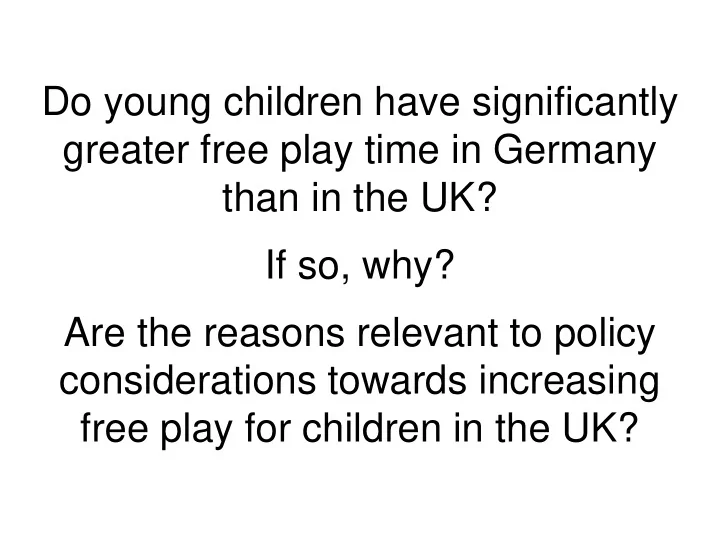

Do young children have significantly greater free play time in Germany than in the UK? If so, why? Are the reasons relevant to policy considerations towards increasing free play for children in the UK?
‘ Raum für Kinderspiel ’ - Space for Children to Play - is a recent German research project based on view that while schooling and structure sports can meet some childhood developmental needs, optimal child development necessitates opportunities for children to interact with each other freely using their imaginations and creativities, without adult interference, in order to develop essential autonomy.
Renz-Polster: “One can learn Pythagorus’ theorem or to play the violin later in life. What cannot be established later are fundamental life skills, such as self confidence, getting on with others and resilience: These are things that one can't be taught. They are things which children develop through play. ….. Play is the business objective of childhood. Up until puberty children instinctively do purposeless stuff and play to their limits,… Our aim must be to support children in building up their fundamental life skills.” (Interview for Badische Zeitung , Dec 2013)
Types of childhood “Autonomous childhood” means that children often play outside their home without supervision for long periods of time, that they are seldom looked after in a child care facility in the afternoon and they often participate in extracurricular activities, such as sports, clubs or music. “Heteronomous childhood” provides little or no opportunity for children to act independently and describes children rarely having opportunities to play outside without adult supervision, often being in organised child care after school, and with little or no participation in extracurricular activities.
Data collected for Raum für Kinderspiel study Observations from workshop tours with children in their neighbourhoods, recording children’s comments and opinions on their play environments. Evaluation of residential areas in terms of quality of ‘action space’ for children, (relatively free of dangers, accessible for children, interesting and opportunity for interaction with other children). Questionnaires completed by parents covering neighbourhood, social climate, play facilities, family size, housing, education, toys and electronic entertainment equipment, immigration background, ages, children’s play patterns including contemporary time- record of their children’s outdoor play over three school days, specifying whether with or without adult supervision. Over 5000 responses.
Criteria for the assessment of action space quality (“ Freiburger Soziotopen Test”, FST ) (Blinkert 1993).
Key findings of Raum für Kinderspiel : Table showing amount of time children played outside without supervision and quality of ‘action space’ 120 80% 74% 70% 100 60% 80 minutes per day 50% per cent 60 40% 108 31% 30% 90 82 40 25% 20% 60 20 41 10% 10% 6% 16 2% 0 0% very poor poor sufficient fair good excellent scale "quality of action space" playing outside without supervision (minutes per day) Children who never play outside without supervision (per cent)
Quality of action space and resources of the family Quality of action space and resources of family 140 The quality of the 'action space' available to 120 children correlates with the economic and quality of action space cultural resources of their families, so that 100 children from socially and materially 80 deprived homes have significantly less opportunity to develop their autonomy 60 116 through the 'latent curriculum' of free play 109 94 than children from more affluent homes : 81 40 'street childhood' has become a sign of wealth rather than poverty. 20 40 0 ‘Raum für Kinderspiel’ German Research very poor poor average good very good resources of family
Autonomous childhood – age and quality of action space (Raum für Kinderspiel German research) 134 autonomous childhood (average scale 140 115 99 114 120 100 82 71 values) 80 78 quality of action space 61 60 51 40 good, very good 20 average 0 very bad, bad 5 years 6 and 7 8 and 9 years years
Selected questions from the UK preliminary comparative research
Overall Average number of minutes played outside Comparison: per day without supervision aged 5 - 9 UK 36 Germany 67 Average number of minutes played outside per day without supervision aged 5 Quality of residential bad medium good environment for children UK 8 24 35 Germany 36 46 52
Preliminary Comparison Germany - UK 99 Minutes per day outside without supervision 90 94 100 90 80 70 60 57 50 48 40 23 30 20 10 9 years old DE 0 9 years old UK bad medium good condition of environment
Parents’ attitudes towards children’s safety / risk in play: UK – Germany comparison Parents were asked: What are the results?
‘Lisa ´ s Dilemma’ - difference between German parents and parents in UK 60 51 50 40 Percent 31 30 Germany 21 UK 20 19 20 15 14 13 12 10 6 0 no, definitely no, probably don´t know, yes, maybe yes, for sure not not perhaps agreement with Lisa`s father Least risk averse …………..……………..... ... .. Most risk averse
Preliminary comparative UK / Germany findings: Strong evidence of significant difference in amount of children’s free play time. Striking difference in parental attitudes towards risk and play. Next Steps: Research to find out why; to identify relevance of legal and policy differences which are relevant towards reclaiming and asserting children’s right to play.
Recommend
More recommend